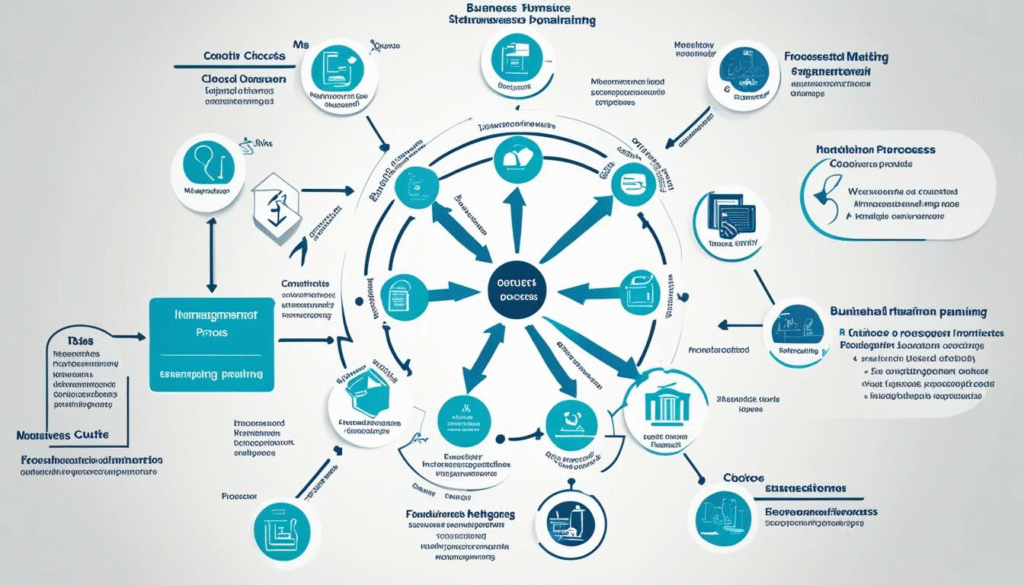Management information systems are tools that help businesses collect, process, and use information to make smart decisions. Every business, whether big or small, needs accurate information to plan, organize, and control its activities. Management information systems make this possible by combining technology, people, and processes. These systems store important data about sales, customers, employees, and resources. With this data, managers can quickly see what is working well and what needs improvement. They can also predict future trends and make decisions that help the business grow. In today’s fast-moving world, companies cannot afford to make decisions without the right information. That is why management information systems are not just helpful but essential. They make complex tasks simple and ensure that businesses run smoothly, saving time, money, and effort while improving overall performance.
Management information systems work like the brain of a business. They gather information from different departments and organize it in a way that is easy to understand. For example, a sales department can track which products are popular, while the finance team can see where money is being spent. These systems also help with communication by allowing different teams to share information quickly and accurately. Many businesses use software programs, cloud systems, and dashboards as part of their management information systems. These tools make it easy to check real-time data and spot problems before they become serious. Even small businesses can benefit from using management information systems because they help owners make smarter choices, plan for the future, and stay ahead of competitors. Overall, management information systems make business operations more efficient, improve decision-making, and help companies grow in a structured way.
What Are Management Information Systems and Why They Matter
Management information systems are not just computers or software—they are systems that combine technology, people, and processes to manage information. They help businesses keep track of all important data in one place. These systems are important because businesses need accurate information to make good decisions. Without the right information, managers might make mistakes that can cost money or time. Management information systems also allow businesses to plan better, reduce errors, and respond faster to problems. They are used in almost every industry, from hospitals and schools to retail stores and banks. By using these systems, businesses can improve efficiency, save resources, and make customers happier.
Key Components of Management Information Systems Every Business Should Know
Management information systems have several important components that make them work:
- Hardware: The computers, servers, and devices that store and process data.
- Software: Programs that help process, manage, and analyze data.
- People: Managers, IT staff, and employees who use the system.
- Processes: Rules and procedures for collecting, storing, and using data.
These components work together to provide meaningful information to decision-makers. For example, a retail company can see which product is selling well and which store needs improvement. Understanding these components helps businesses choose the right system and make it work efficiently.
How Management Information Systems Improve Decision Making
One of the main benefits of management information systems is better decision-making. These systems give managers access to accurate and up-to-date data. For example, a business can see sales trends, customer preferences, and financial status in real-time. This allows managers to make quick decisions and avoid mistakes. Management information systems also help in long-term planning by providing reports and forecasts. When managers have the right information at the right time, they can improve productivity, reduce costs, and increase profits.
Real-Life Benefits of Using Management Information Systems

Management information systems help businesses in many ways:
- Better Communication: Employees can share information easily across departments.
- Increased Efficiency: Automates tasks like data entry and report generation.
- Cost Savings: Reduces errors and unnecessary expenses.
- Customer Satisfaction: Helps businesses respond faster to customer needs.
These benefits make businesses more competitive and prepared for changes. For example, a store using a management information system can track inventory in real-time and avoid running out of popular products.
Different Types of Management Information Systems Explained
There are several types of management information systems, and each serves a unique purpose:
- Transaction Processing Systems (TPS): Handle everyday transactions like sales or payroll.
- Decision Support Systems (DSS): Help managers make decisions by analyzing data.
- Executive Information Systems (EIS): Provide top-level executives with summarized reports and dashboards.
- Knowledge Management Systems (KMS): Organize knowledge and experience within the organization.
Understanding the types helps businesses choose systems that match their goals and operations.
Management Information Systems in Small vs. Large Businesses
Small and large businesses use management information systems differently. Large businesses often have complex systems that handle millions of transactions, employees, and departments. Small businesses may use simpler systems to track sales, customers, and expenses. However, both benefit from using management information systems. For small businesses, these systems save time and help make smart decisions. For large businesses, they ensure efficiency, coordination, and better planning across many departments.
How Technology Supports Management Information Systems
Technology is at the heart of management information systems. Computers, cloud storage, and software programs make it possible to store, process, and share data easily. Mobile devices allow managers to access information anytime and anywhere. Artificial intelligence and analytics tools help predict trends and improve decision-making. By combining technology with proper processes and trained staff, businesses can get the most out of their management information systems.
Common Challenges in Implementing Management Information Systems

Implementing management information systems is not always easy. Some common challenges include:
- High cost of software and hardware.
- Resistance from employees who are not used to new systems.
- Data security and privacy concerns.
- Maintenance and updates of the system.
Businesses need careful planning, proper training, and security measures to overcome these challenges.
How Management Information Systems Boost Productivity and Efficiency
By automating routine tasks, management information systems save time for employees. Reports can be generated quickly, errors are minimized, and data is easy to access. Teams can focus on important tasks like planning and improving customer service. This leads to higher productivity and more efficient business operations. Businesses can also identify bottlenecks and improve processes using information from these systems.
Future Trends in Management Information Systems
The future of management information systems is exciting. Cloud computing, artificial intelligence, and big data are changing how businesses use information. Predictive analytics will help companies forecast trends more accurately. Mobile access and collaboration tools will make these systems more flexible. Businesses that adopt these new trends will be better prepared to compete and grow.
Tips for Choosing the Right Management Information Systems for Your Business
Choosing the right system is important. Some tips include:
- Understand your business needs.
- Consider scalability for future growth.
- Check software compatibility with existing tools.
- Ensure good customer support and training.
- Focus on security and data privacy.
Selecting the right management information system ensures smooth operations and long-term success.
How Management Information Systems Help Businesses Stay Competitive

In today’s fast-changing world, businesses need an edge to stay competitive. Management information systems help by providing accurate data, improving decision-making, and boosting efficiency. Companies can respond quickly to market trends, understand customer needs, and optimize operations. Businesses that use these systems effectively have a better chance of growing and staying ahead of competitors.
Conclusion
Management information systems are essential tools for every business. They collect, process, and organize information to help managers make smart decisions. These systems improve communication, increase efficiency, reduce costs, and enhance customer satisfaction. Whether a small business or a large corporation, management information systems make operations smoother and help companies grow. By understanding their components, types, and benefits, businesses can choose the right system and use it to achieve long-term success.
FAQs
Q1: What is a management information system?
A management information system is a tool that collects, processes, and uses information to help businesses make smart decisions.
Q2: Why are management information systems important?
They are important because they provide accurate data, improve decision-making, boost efficiency, and save time and money.
Q3: Can small businesses use management information systems?
Yes, small businesses can use simpler systems to track sales, customers, and expenses, which helps them grow and compete.
Q4: What are the main types of management information systems?
The main types include Transaction Processing Systems (TPS), Decision Support Systems (DSS), Executive Information Systems (EIS), and Knowledge Management Systems (KMS).
Q5: What challenges do businesses face when implementing management information systems?
Common challenges include high costs, employee resistance, data security issues, and system maintenance.

дизайн интерьера квартиры бюро дизайна интерьера спб
дизайн проект квартиры цена дизайн студия интерьера санкт петербург
Нужен трафик и лиды? яндекс реклама казань SEO-оптимизация, продвижение сайтов и реклама в Яндекс Директ: приводим целевой трафик и заявки. Аудит, семантика, контент, техническое SEO, настройка и ведение рекламы. Работаем на результат — рост лидов, продаж и позиций.
Нужен трафик и лиды? разработка сайтов в казани SEO-оптимизация, продвижение сайтов и реклама в Яндекс Директ: приводим целевой трафик и заявки. Аудит, семантика, контент, техническое SEO, настройка и ведение рекламы. Работаем на результат — рост лидов, продаж и позиций.
лучшие сервисы рассылки сервис email рассылок российский
задвижка 30с41нж ду 400 30с41нж
Hello team!
I came across a 153 great page that I think you should take a look at.
This platform is packed with a lot of useful information that you might find helpful.
It has everything you could possibly need, so be sure to give it a visit!
https://apkinstallation.com/how-do-i-redeem-my-bonus-on-22bet/
Additionally do not overlook, everyone, that one constantly are able to inside this piece discover responses for your the very complicated inquiries. The authors tried to lay out all of the information in the most extremely accessible method.